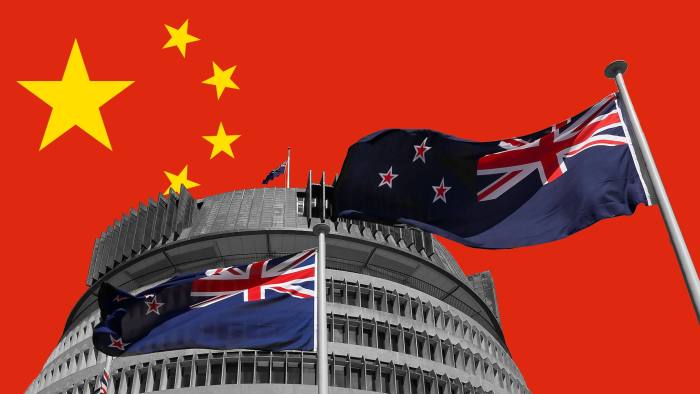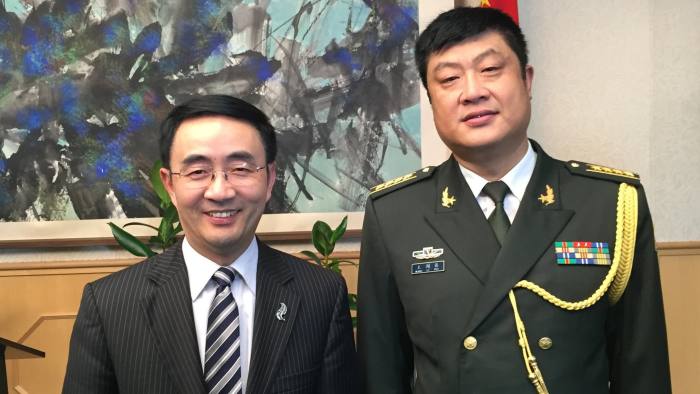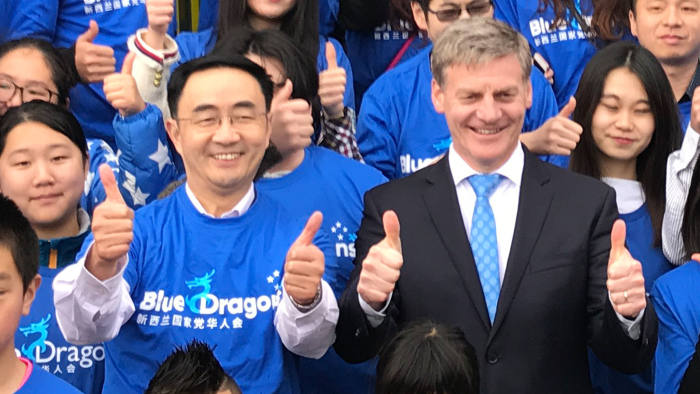By Jamil Anderlini in Hong Kong

Chinese mole Jian Yang spent decade at elite Chinese military academies. The Beehive, part of New Zealand's parliament buildings, where Jian Yang has served as an MP since 2011.

Jian Yang, left, with Senior Colonel Wang Liwei, defence attaché, at an event held at the Chinese embassy in Wellington to mark the 88th anniversary of the founding of the People's Liberation Army in 2015.

The mole and New Zealand Prime Minister Bill English give the thumbs up at a campaign event.
New Zealand’s national intelligence agency has investigated a China-born sitting member of parliament in connection with the decade he spent at leading Chinese military colleges.
Jian Yang, an MP for New Zealand’s ruling National Party, spent more than 10 years training and teaching at elite facilities including China’s top linguistics academy for military intelligence officers, the Financial Times has learnt.
Since being elected in 2011, Yang has been a big fundraiser for the National Party.
He has consistently pushed for closer ties with Beijing and for international policies and positions echoing those of China’s Communist party.
The fact he has served for six years in the governing party of a member country of the “five eyes” intelligence alliance raises questions about western preparedness to deal with China’s increasingly aggressive efforts to influence foreign governments and spy on them.
“China has been very active in recent years placing and cultivating people at the grassroots political levels of western democracies and helping them to reach positions of influence,” said Christopher Johnson, a former senior China analyst at the US Central Intelligence Agency now at the Center for Strategic and International Studies in Washington.
Mr Johnson warned that while Beijing appeared to see New Zealand as a softer target than countries such as the US and UK, “it is using it as a testing ground for future operations in other countries”.
Yang, 55, lived in China until he was 32.
No information about his Chinese education or military background is included in his official biographies in New Zealand or those published when he was an academic at Auckland university.
He served on New Zealand’s parliamentary select committee for foreign affairs, defence and trade from October 2014 until he was replaced in March 2016.
As number 33 on the National Party list for the September 23 general election he is very likely to be returned to parliament for a third term under the country’s mixed member proportional electoral system.
Yang on Wednesday insisted he was "loyal" to New Zealand, said the reports about his background were a “smear campaign” and suggested that anti-Chinese racism was the motive.
After the FT published its investigation, at a press conference in Auckland he said he had never been a spy but acknowledged training people who went on to be intelligence officers.
“If you define those cadets or students as spies, yes, then I was teaching spies,” he told reporters.
“I don’t think so. I just think they are collecting information through communication in China.”
The National Fifth Column
Peter Goodfellow, president of the National Party and the person who recruited Yang, said his background was “public knowledge” in New Zealand and he had “no idea” about an investigation by the country’s Security Intelligence Service (SIS).
“He certainly gave us his full résumé with the two universities — an air force academy and the other one,” Mr Goodfellow said.
He also said Yang’s background was “covered in a review of candidates” by a government relations consultancy, Saunders Unsworth.
Prime Minister Bill English told New Zealand media on Wednesday that he had been aware “from early on” of Yang’s “military training, including military intelligence”.
Someone with Yang’s background would not normally gain security clearance to work on foreign affairs in New Zealand but elected MPs are exempt from such requirements.
Yang has represented New Zealand on numerous official trips to China and been present at many high-level meetings between the two countries’ leaders.
Several New Zealand politicians have been briefed by the SIS on its interest in Yang, a naturalised New Zealand citizen.
SIS agents also conducted interviews with people familiar with Yang’s background as recently as last year, according to people with direct knowledge of the matter.
The SIS told the Financial Times it did not comment on operational matters, especially investigations involving individuals.
A spokesperson for China’s foreign ministry said on Wednesday it did not comment on the internal affairs of other countries but nevertheless rejected what it said were “groundless, false accusations”. In 2010 the director of Canada’s Security Intelligence Service warned that several Canadian provincial cabinet ministers and government employees were “agents of influence” under the control of China.
In recent months Australia has also indicated it is concerned about Chinese intelligence operations and covert campaigns influencing the country’s politics.
But no other western country is known to have a sitting member of parliament with such extensive training in China’s military intelligence apparatus.
“In the last five to 10 years, Chinese intelligence agencies have moved heaven and earth to recruit anyone in public life anywhere in the world who they think might work for them,” said one person familiar with Yang who is an expert in China’s global intelligence efforts.
“With his education background [Yang] would be a prime target if he was not already an active agent.”
Yang entered the People’s Liberation Army Air Force Engineering Academy as an undergraduate majoring in English language in 1978 and later taught at the academy after graduation.
“Someone who taught at that institute would have to be an officer in the PLA as well as a member of the Communist party,” said Peter Mattis, an expert on China’s military and intelligence at the Jamestown Foundation in Washington.
After teaching at the air force academy, Mr Yang went on to the Luoyang Foreign Languages Institute, an elite facility for China’s military intelligence officers.
It is attached to the third department of the PLA general staff headquarters — equivalent to the US National Security Agency or the UK’s Government Communications Headquarters — and specialises in training both openly acknowledged military intelligence officers and “secret line” deep cover agents.
“Everyone I know who’s attended the Luoyang Foreign Language Institute has been in Chinese military intelligence or at least linked to that system,” Mr Mattis said.
In a Chinese-language interview with the FT, Yang acknowledged he had attended the PLA Air Force Engineering Academy and the Luoyang Foreign Languages Institute but repeatedly requested that this information not be included in any article about him, saying “there’s no need to write too much about my personal situation”.
He declined numerous subsequent interview requests over several days.
Interviewed on Wednesday by Newsroom, a New Zealand-based independent media group, Yang refused to comment, saying repeatedly on camera: “Ask my boss” and “I have nothing to hide”.
He then drove away, but after publication of the story on Wednesday he issued a statement calling the news a “smear campaign” and suggesting racism as the motive.
He said: “I refute any allegations that question my loyalty to New Zealand.
“I have been nothing but upfront and transparent about my education and employment. Although I was not born here, I am proud to call myself a New Zealander, obey our laws, and contribute to this country.”
He added: “This is a smear campaign by nameless people who are out to damage me and the National party 10 days from an election, just because I am Chinese.”
A former senior British intelligence official said someone with Yang’s educational background would usually go on to a career in military intelligence.
After graduating from Luoyang, Yang studied between 1988 and 1989 at the Hopkins-Nanjing Center for Chinese and American Studies.
At that time the majority of Chinese students attending were either military intelligence officers or Chinese state security agents, according to three former senior western intelligence officials.
One of Yang’s classmates was Xu Meihong, a famous Chinese military intelligence officer who was assigned in 1988 to spy on a visiting US history professor but was subsequently arrested on suspicion of betraying her country.
Ms Xu later married the professor, Larry Engelmann, became a venture capitalist in Silicon Valley and wrote a book about her experience entitled Daughter of China: A True Story of Love and Betrayal.
It is unclear what Yang did between 1989 and 1994, the year he was granted an “AusAID” scholarship to study at the Australian National University in Canberra.
Given his background, Yang would have needed permission from the Chinese government and military to leave China.
At ANU he completed a masters degree and PhD focused on US Congressional policy towards China and in 1999 he moved to New Zealand to teach international relations at Auckland university.
Yang has been a big National party fundraiser among New Zealand’s large Chinese community, including from big-spending anonymous donors, according to local media reports.
Aucun commentaire:
Enregistrer un commentaire